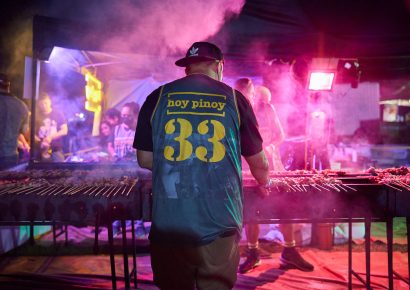Green Music Australia (GMA) – the peak national body for artists and industry working to create a cleaner, greener music sector – has released the ultimate guide for musicians passionate about making their careers environmentally sustainable.
Authored by Bundjalung arts executive and producer Rhoda Roberts AO and environmental consultant, facilitator and singer-songwriter Matt Wicking, Sound Country: A Green Artist Guide is a comprehensive step-by-step handbook on how musicians can care for Country and protect our earth.
“When touring as a keys player, I saw first-hand the environmental impact of traveling across the continent and staging large shows” explains CEO of Green Music Australia, Berish Bilander. “For years, musicians have been asking us what they can do to better care for the planet”
The result is Sound Country: A Green Artist Guide, a free 60+ page resource funded by the Victorian Government through Creative Victoria which unpacks how musicians can live an eco-friendly life. Built on Green Music’s decade of work, research, and advocacy, it includes case studies, checklists and a clear list of actions artists can take on sustainable touring, recording, food, waste, merchandise, and importantly how to support First Nations peoples.
Here are eight top tips musicians can take to become more environmentally friendly.
- Centre First Nations leadership and voices
View this post on Instagram
Aboriginal and Torres Strait Islander peoples have been caring for Country for tens of thousands of years. These ancient and enduring cultures see humans as part of the land and remind us that our wellbeing is interconnected with all living things, the sky, land, and water. Therefore, First Nations justice lies at the forefront of the music industry’s green revolution.
“First Nations people have had over 60,000 years of practice at listening to Country and learning how to walk on it,” explains Djugun artist NIDALA.
“To place Indigenous voices first is to acknowledge the fact we are in a race against time when it comes to climate change, and we need to follow the lead of those who began their walk of sustainability far ahead of today’s Australia.”
Listening, engaging, and supporting First Nations peoples and cultures is a lifetime’s work, but Sound Country provides some starting points, advice, and suggested resources on where you can begin.
One of the most powerful things artists with a platform can do is to advocate for First Nations musicians, sharing work, offering headline billing, stage time, and support slots. Check out this superb list of First Nations music, radio and media as a starting point.
As a musician, you have fans who look up to you. So what you say, do, and sing about can have a massive impact. The most effective way to foster change is through being a role model and speaking about the issues that resonate with you.
Let your fans, the industry, media, and government know how you feel about the climate emergency and the extinction crisis. Let them know what’s special to you about the Country you were born on, and the places you live amongst and love now. Share green actions with your fans and invite them to join you.
Want to learn more? Sound Country provides examples on how to best talk about current issues, share action ideas with suppliers, support organisations creating change, and encourage fans to get on board.
- Green your office & studio
Musicians spend most of their time in an office and studio space when not on tour. By greening these locations, you can start making positive changes for the planet immediately. Switch to an environmentally-friendly electricity provider and energy efficient equipment to reduce your carbon footprint. Sound Country features advice on how to improve your space and help the environment.
Your day-to-day admin can also have an impact on the planet. Sound Country provides advice on how to look at your banking, ticketing, and music releases to lessen your environmental impact.
- Audit and reduce your waste
View this post on Instagram
Did you know almost every piece of plastic created still exists? There are countless ways musicians can care for the environment through reducing, reusing, recycling, and disposing of waste effectively.
Sound Country outlines great tips including having a talk with your council or using Planet Ark’s Recycling Near You site, using pre-loved music gear before buying new, joining the BYOBottle movement by making a BYOBottle Artist Commitment, and requesting real plates, glasses and utensils backstage or bringing your own metal lunch boxes and reusable cutlery, straws, cups and bowls.
Speak with Green Music Australia if you’d like support to green your tour.
- Consider green transport options
The average 15-show Australian tour creates a whopping 28 tonnes of carbon emissions. With the transport sector representing 18% of Australia’s annual emissions, transport is the country’s second largest source of pollution.
By improving planning, reducing the number of trips, taking efficient routes, and using more efficient transport modes such as driving instead of flying, musicians can significantly reduce the impact of their transport.
Importantly, musicians can communicate with fans about transport options, prioritising venues that are easy to get to by public transport, walking or riding, and encouraging fans to take better transport options.
- Switch your food
When on the road, it can be difficult to make sustainable food choices. But, there are lots of good reasons for pondering the source of our food. Nasty agricultural practices spread toxins, damage land and waterways, hurt our kin (the other creatures and beings we live among), and our own personal health. Food waste is also a major contributor to global heating with meat production contributing at least 23% of the world’s greenhouse gases.
By lessening meat consumption, artists and their touring parties can help drastically cut your diet’s carbon footprint.
Want to learn more? Sound Country provides tips on buying from bulk food stores (using this Australia-wide directory) and reducing your packaging and waste, shopping locally and finding your nearest farmer’s market. Musicians can learn more about shopping sustainably with this Sustainability Victoria guide.
- Sell greener merchandise
Purchasing merchandise is one of the top ways to support artists, but 60% of new clothes are made from synthetic fibres that do not biodegrade and fill our waterways and oceans with microplastics.
Sound Country proves that there are brilliant ways musicians can make their fashion and merchandise both eco-friendly and ethical.
Select sustainable fashion by looking for brands that use organic cotton or hemp, recycled content, and fair-trade working conditions. Check out Sound Country’s list of green merchandise suppliers.
- Share Sound Country with other musicians
View this post on Instagram
Know a muso who is keen to make a positive impact?
Share Sound Country with them. With more artists taking action to support the future of our planet, musicians can use their audience and cultural power for good.
Green Music CEO Berish Bilander explains “What is truly exciting is the power musicians have to inspire change. By going green themselves, artists can lead by example and inspire their fans to do the same. The potential to create large-scale cultural change is vast.”
Legendary bands such as Regurgitator want their fellow musicians to get on board: “For the past decade or so we have been considering and struggling with how to reconcile the environmental concerns we face in touring. We wholeheartedly endorse Green Music Australia’s SOUND COUNTRY project as the perfect starting point to approach touring and music industry practice with greater awareness, intent and reform in seeking a safer and just future.”
To make a lasting difference to your society, community, and environment visit and download Sound Country at soundcountry.org

